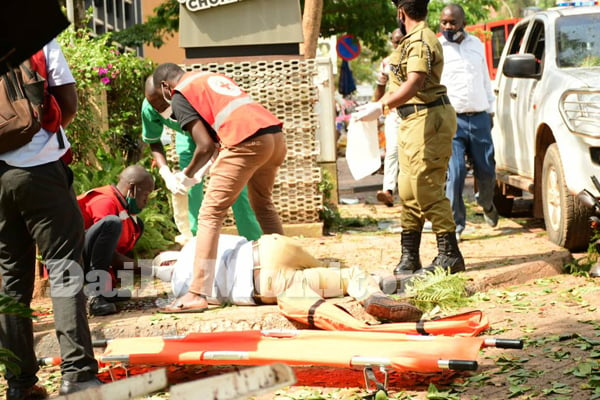Police name Ugandans killed in Kampala twin blasts

Forensic officers and police pictured inside a security cordon at Parliamentary Avenue, Kampala, one day after a November 16 twin explosions. PHOTO/ DAVID LUBOWA
What you need to know:
- Tuesday's attacks occurred within minutes of each other, with two suicide bombers on motorbikes disguised as "boda boda" motorcycle taxi drivers detonating a device near parliament, while a third attacker targeted a checkpoint near the central police station.
- Investigations are ongoing into the blasts, with police hunting for suspects, after foiling a third bombing on Tuesday and shooting dead the attacker.
One of the people killed in Tuesday’s suicide explosions that hit Kampala is a police constable, authorities have said.
Police Spokesperson, Mr Fred Enanga said Wednesday that Police Constable Amos Kungu died instantly in the explosion near Central Police Station checkpoint.
He identified the other three as Ismail Basibe, Christopher Sande and George Katana who succumbed to injuries he sustained in the explosion at Parliamentary Avenue.
Katana died at Mulago National Referral Hospital where he had been admitted.
In the aftermath of the blasts in which three suspected suicide bombers died, 35 injured persons (27 males and eight females) were checked into Mulago Hospital. Several were discharged yesterday.
“Twenty-one are going to be discharged today (yesterday), meaning that their injuries were relatively minor,” Mulago Hospital executive director, Dr Baterana Byarugaba said, adding: “[Thirteen] remain at various wards, and, of these, two are critically sick and are admitted to ICU (Intensive Care Unit).”
The bomb blast victims who were received at the hospital had a wide range of injuries, including soft and deep tissue damage.
In a statement on Tuesday, President Museveni referred to the attackers as “pigs” before warning: “…the terrorists invited us and we are coming for them.”
“They have exposed themselves when we are more ready for urban terrorism. They will perish. Rural terrorism was defeated in 2007 in Semliki National Park. I am referring to the dead terrorists as manipulated victims of confusion,” Mr Museveni said in a statement on Tuesday evening.
The bombs — improvised explosive devices (IED) — went off between 10:03am and 10:06am. By 10:30am, about 15 victims had been taken to Mulago Hospital.
Tuesday's attacks occurred within minutes of each other, with two suicide bombers on motorbikes disguised as "boda boda" motorcycle taxi drivers detonating a device near parliament, while a third attacker targeted a checkpoint near the central police station.
Police said they were the work of "domestic terrorists" linked to the Allied Democratic Forces (ADF), an armed group active in eastern Democratic Republic of Congo.
They followed two attacks last month also blamed by Kampala on the ADF, which the United States has linked to the IS group.
'Focusing on Uganda'
Investigations are ongoing into the blasts, with police hunting for suspects, after foiling a third bombing on Tuesday and shooting dead the attacker.
Police last month arrested a number of alleged ADF operatives and warned that extremists were believed to be plotting a new attack on "major installations".
The arrests followed a bus explosion near Kampala that wounded many people and a bombing at a roadside eatery in the capital that killed one woman.
Uganda also blamed the ADF for a foiled attack in August on the funeral of an army commander who led a major offensive against Al-Shabaab militants in Somalia.
Washington in March linked the ADF to IS, which in 2019 began to claim some ADF attacks on social media, presenting the group as its regional branch -- the Islamic State Central Africa Province, or ISCAP.
The ADF, historically a Ugandan rebel group, has been accused of killing thousands of civilians in eastern DRC.
Experts consider the ADF to be the bloodiest of more than 120 armed groups that roam eastern DRC, many of them a legacy of two regional wars a quarter of a century ago.
In 2010, twin bombings in Kampala targeting fans watching the World Cup final left 76 people dead, with Al-Shabaab claiming responsibility.
The attack was seen as revenge for Uganda sending troops to Somalia as part of an African Union mission to confront Al-Shabaab.




